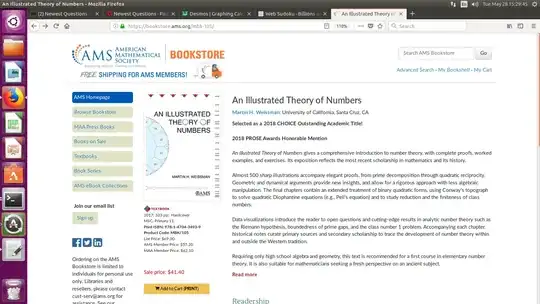I have a function defined by $f=(2c-1)^2-2b^2$. I want to express this in the form of a linear diophantine equation. I tried $f_1=8m\pm 1$ for some $m$, but it unfortunately does not work since for example $f=65$ never occurs for any value of $b$ or $c$. So, the question is can such a linear diophantine relation be written?
Asked
Active
Viewed 153 times
1 Answers
1
Well, you have forced the represented numbers to be odd, indeed $\pm 1 \pmod 8 \; .$
So that is it, an odd number is represented if and only if all prime factors $q \equiv \pm 3 \pmod 8$ occur with even exponents. Indeed, if there are any such $q,$ we must have $q | b$ and $q| (2c-1).$ In your example, $65 = 5 \cdot 13,$ each with odd exponent $1,$ each $5 \pmod 8.$
In particular, any odd number, all of whose factors are $\pm 1 \pmod 8 \; ,$ can be expressed this way
Why not: here are the primes $p = u^2 - 2 v^2$ up to 1000. The prime $2$ is included here by the program, although your polynomial cannot actually represent any even number.
jagy@phobeusjunior:~$ ./Conway_Positive_Primes 1 0 -2 1000 8
1 0 -2 original form
1 2 -1 Lagrange-Gauss reduced
Represented (positive) primes up to 1000
2 7 17 23 31 41 47 71 73 79
89 97 103 113 127 137 151 167 191 193
199 223 233 239 241 257 263 271 281 311
313 337 353 359 367 383 401 409 431 433
439 449 457 463 479 487 503 521 569 577
593 599 601 607 617 631 641 647 673 719
727 743 751 761 769 809 823 839 857 863
881 887 911 919 929 937 953 967 977 983
991
=-=-=-=-=-=-=-=-=-=-=-=-=-=-=-=-=-=-=-=-=-=-=-=-=-=-=-=-=-=-=-=-=-=-=-=-=-=-=-=-=
these are the collection of remainders when dividing by 8
1 2 7
Represented (positive) primes up to 1000 and value mod 8
1 0 -2 original form
A good book for self study of number theory, currently on sale at about $42 I guess shipping also costs.
Will Jagy
- 139,541
-
Hello @Will Jagy , looking back at your answer, I am a bit confused as to how did you arrive at the statement "an odd number is represented if and only if all prime factors q≡±3(mod8) occur with even exponents"? Could you please explain? – RTn May 28 '19 at 20:51
-
@RTn that is fairly long, although standard. Have you had a course in number theory that includes the Legendre Symbol and Quadratic Reciprocity? – Will Jagy May 28 '19 at 21:29
-
I am an electronics engineer by trade and I have not much experience with mathematics. I am trying to learn in my free time and so, to answer your question, no, I have not had any course in number theory. Can you please point to some books or journal papers that may be of help? – RTn May 28 '19 at 22:05
-
Well, a good book that is suitable for self study, also inexpensive, is Weissman, An Illustrated Theory of Numbers. Currently on sale, it appears : https://bookstore.ams.org/mbk-105/ – Will Jagy May 28 '19 at 22:11
-
Oh.. Thanks a lot.. Much appreciations for your suggestion! Also, I have a question of the modular arithmetic involving sum of two squares (https://math.stackexchange.com/questions/3243171/proving-that-an-expression-can-never-be-a-perfect-square) If it is possible, could you please take a look and help me solve it so that I can use it as a reference for future exercises? – RTn May 28 '19 at 22:48
